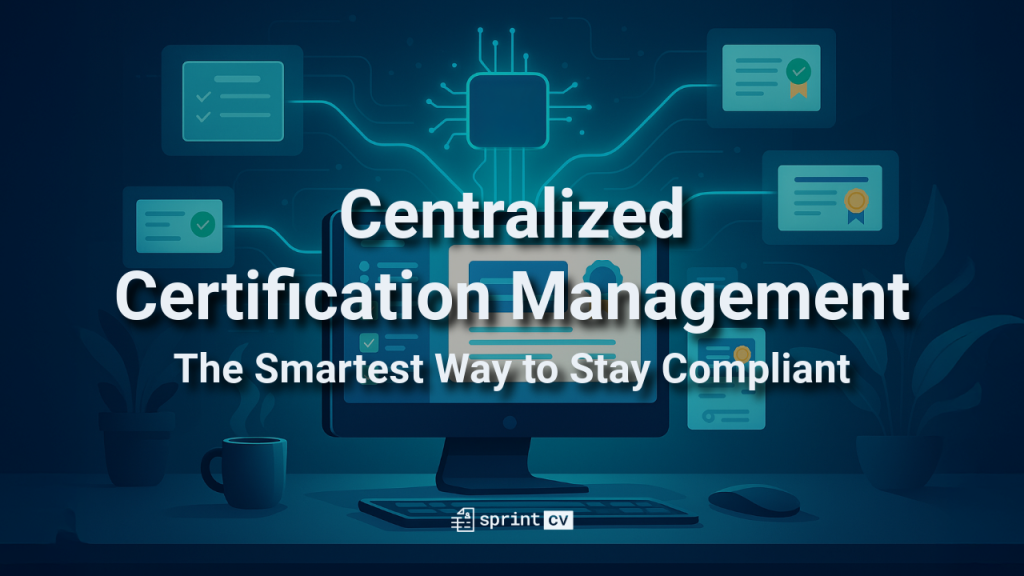In today’s competitive tech industry, certifications are more than just credentials, they’re strategic assets. Whether it’s AWS, Azure, Cisco, or SAP, certifications validate expertise, open doors to new clients, and help companies maintain their partner statuses with major vendors. Yet, despite their importance, many companies still manage certifications the old-fashioned way, scattered across Excel files, inboxes, and folders. The result? The certification management is a mess. Missed renewals, lost certificates, last-minute scrambles, and teams that operate with incomplete data.
The truth is simple: without a centralized, automated system to manage employee certifications, companies risk inefficiency, compliance issues, and missed business opportunities. Let’s explore how centralizing certification tracking can transform operations across departments – from HR and management to sales – and how tools like Sprint CV are helping companies make the leap from manual chaos to digital efficiency.
The hidden chaos behind manual certification management
For many IT and consulting companies, managing employee certifications feels like juggling blindfolded. Each consultant has their own set of credentials, expiry dates, and vendor accounts. HR might keep some records, project managers might maintain others, and sales might request copies when needed, often at the last minute.
This fragmented process creates several recurring problems:
- Lost or outdated certificates: Without a centralized location, certificates are buried in email attachments or lost when employees change teams.
- Expired certifications: Managers aren’t aware of upcoming expirations, leading to lapses that can jeopardize project eligibility or vendor partnerships.
- Inefficient reporting: When a client asks for proof of expertise, the team scrambles to gather documents from multiple sources – a process that can take hours or even days.
- Poor visibility: Leadership has no clear, real-time overview of the company’s technical skill set or certification coverage.
For example, if your company is a Gold Partner of Microsoft or SAP, maintaining that status requires a certain number of certified professionals with valid credentials. If even a few certifications expire unnoticed, you risk losing that partner status, along with access to exclusive opportunities, discounts, and credibility. That’s where centralization becomes not just a convenience, but a necessity.
From Excel chaos to smart certification management
So, what does an optimized certification management system look like? Let’s compare the two realities:
Before: The manual approach
- HR tracks certifications on a spreadsheet.
- Employees update their training status by email.
- Certificates are stored in shared folders.
- Managers rely on periodic reminders or memory.
After: The centralized, automated approach
- All certifications are stored in a single platform.
- Expiry dates are automatically tracked, with reminders sent in advance.
- Certificates are uploaded, verified, and accessible anytime.
- Sales and project teams can instantly filter and identify staff with specific qualifications.
This simple shift from manual to automated processes has far-reaching benefits across the organization.
Why centralizing certifications matters beyond compliance
Most companies first consider certification management for compliance reasons, avoiding expired credentials and maintaining vendor statuses. But the real value goes far beyond that.
1. Smarter resource planning
When you know exactly who holds which certifications and when they expire, project allocation becomes faster and more accurate. Managers can assign tasks with confidence, ensuring that only qualified professionals are deployed. It also helps identify skill gaps early, so training investments can be planned proactively rather than reactively.
2. Stronger collaboration across departments
A centralized certification dashboard serves multiple teams at once:
- HR gains a real-time view of employee qualifications and training needs.
- Managers can monitor team readiness and certification renewals.
- Sales can instantly verify the technical credentials required for new bids or client proposals.
In short, everyone works from the same source of truth, improving internal communication and reducing dependency on endless email chains.
3. Sales enablement and client confidence
In consulting, sales conversations often include one key question: “Can you prove your team’s expertise?”
With centralized data, sales teams can immediately export accurate, up-to-date certification reports. Whether responding to tenders, RFQs, or client audits, they can demonstrate compliance and expertise within minutes. This agility gives companies a clear competitive edge, because in a fast-moving market, the first to respond often wins the deal.
4. Reduced admin burden and human error
Manual tracking isn’t just time-consuming and unreliable. With multiple stakeholders involved, it’s easy for key data to be missed or entered incorrectly. Automation removes that risk. Smart systems like Sprint CV automatically send reminders before certifications expire, ensuring renewals happen on time. Managers and employees receive alerts, removing the need for constant manual follow-up.
Real-time visibility: the foundation of digital maturity
A modern tech company thrives on visibility. Leaders can’t make data-driven decisions if information is buried in spreadsheets or siloed systems. Centralized certification management gives companies a real-time overview of their most valuable asset: their people’s skills and qualifications.
With an automated dashboard, you can:
- See which certifications are valid, expired, or upcoming for renewal.
- Filter certifications by technology, project, or department.
- Plan training and re-certification budgets with precision.
- Generate instant reports for audits, vendor renewals, or client proposals.
This level of visibility supports not only compliance but also strategic workforce planning, ensuring your company stays ready for any opportunity that arises.
Beyond HR: how certification management empowers sales and operations
One of the most overlooked aspects of certification tracking is its impact on sales and operations. When your sales team can instantly see which consultants are certified in which technologies, they can match opportunities to talent faster. That means fewer missed deals, faster proposal turnaround, and more confident client communication.
Operations teams, meanwhile, benefit from reduced chaos during audits and tenders. Instead of manually collecting data, they can generate proof of competence in seconds, improving both efficiency and credibility. Ultimately, certification management is not just an HR function. It’s a business enabler.
How Sprint CV simplifies certification tracking
At Sprint CV, we’ve seen firsthand how manual certification tracking slows companies down. That’s why we developed a centralized certification module designed for modern tech teams.
With Sprint CV, companies can:
- Centralize all certifications in one secure digital repository.
- Upload certificates and proof documents (PDFs, images, etc.).
- Track expiry dates automatically, with reminders sent to employees and managers.
- View real-time data in the company’s talent dashboard.
- Empower sales teams with instant access to verified certifications for proposals and bids.
By replacing scattered spreadsheets with a structured, automated process, Sprint CV helps companies stay compliant, competitive, and connected.
From compliance to competitive advantage
In 2025, IT managers face increasing pressure to balance team performance, vendor compliance, and sales enablement. Certification tracking may not seem like a top priority, until it starts costing deals, partnerships, or credibility. The companies that thrive in the coming years will be those that treat certification management not as a bureaucratic task but as a strategic pillar.
A centralized, automated system ensures every certification adds value to the business – keeping your teams sharp, your partnerships strong, and your opportunities open.
The future of work is digital, and so should your certification management be. Centralizing this process doesn’t just eliminate administrative headaches, it drives alignment, transparency, and trust across your entire organization. From HR to sales, from compliance to culture, a single source of truth for certifications is the foundation of operational excellence.
With our Entreprise CV Manager, you can stop chasing spreadsheets and start managing talent strategically. Learn more about how Sprint CV helps companies automate certification tracking and stay partner-ready by booking a demo with us.
Cloud Software
Berita Olahraga
Lowongan Kerja
Berita Terkini
Berita Terbaru
Berita Teknologi
Seputar Teknologi
Berita Politik
Resep Masakan
Pendidikan

